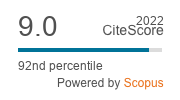Diet-related modulation of gut microbiota and its metabolic activity represents an intriguing research context, particularly in the case of disorders related to imbalances in gut microbial communities. We here explored the effects of Bacillus coagulans GBI-30, 6086 (BC30), β-glucans, and innovative whole-grain pastas, with or without these functional ingredients, on gut microbiota from three groups of children, presenting different susceptibility to type 1 diabetes, by using the well-controlled TNO in vitro model of the proximal colon (TIM-2). Short- and branched-chain fatty acids production and microbiota composition were assessed by means of gas chromatography and 16S rRNA gene profiling, respectively. In most cases, in vitro dietary interventions caused microbiota-dependent modulations as a result of intergroup variability, but also specific changes in microbial groups were shared between the three microbiotas, highlighting specific diet-microbial taxa connections.
RESEARCH ARTICLE
Effects of functional pasta ingredients on different gut microbiota as revealed by TIM-2 in vitro model of the proximal colon
A. Martina Related information
1Department of Biotechnology, University of Verona, Strada le Grazie 15, 37134 Verona, Italy.
, G.E. Felis Related information1Department of Biotechnology, University of Verona, Strada le Grazie 15, 37134 Verona, Italy.
, M. Corradi Related information2Unit of Pediatric Diabetes and Metabolic Diseases, Regional Center for Pediatric Diabetes, Department of Surgical Sciences, Dentistry, Gynecology and Pediatrics, University of Verona, P.le Stefani, 1, 37126 Verona, Italy.
, C. Maffeis Related information2Unit of Pediatric Diabetes and Metabolic Diseases, Regional Center for Pediatric Diabetes, Department of Surgical Sciences, Dentistry, Gynecology and Pediatrics, University of Verona, P.le Stefani, 1, 37126 Verona, Italy.
, S. Torriani Related information1Department of Biotechnology, University of Verona, Strada le Grazie 15, 37134 Verona, Italy.
*Corresponding author: sandra.
, K. Venema Related information*Corresponding author: sandra.
3Maastricht University – campus Venlo, Centre for Healthy Eating and Food Innovation, NUTRIM School of Nutrition and Translational Research in Metabolism, St. Jansweg 20, 5928 RC Venlo, the Netherlands.
4Beneficial Microbes Consultancy, Johan Karschstraat 3, 6709 TN Wageningen, the Netherlands.
4Beneficial Microbes Consultancy, Johan Karschstraat 3, 6709 TN Wageningen, the Netherlands.
Beneficial Microbes: 10
(3)- Pages: 301 - 313
Published Online: March 04, 2019
2022 Journal Impact Factor
5.4
source: Journal Impact Factor 2023™ from Clarivate™

Institutional Offers
For institutional orders, please contact [email protected].
-
A.A. Hibberd, C.C. Yde, M.L. Ziegler, A.H. Honoré, M.T. Saarinen, S. Lahtinen, B. Stahl, H.M. Jensen and L.K. Stenman
-
E.E. Blaak, E.E. Canfora, S. Theis, G. Frost, A.K. Groen, G. Mithieux, A. Nauta, K. Scott, B. Stahl, J. van Harsselaar, R. van Tol, E.E. Vaughan and K. Verbeke
-
K. Venema, J. Verhoeven, C. Beckman and D. Keller
-
E. Arvidsson Nordström, C. Teixeira, C. Montelius, B. Jeppsson and N. Larsson
-
J.E. Haarhuis, A. Kardinaal and G.A.M. Kortman
-
E.E. Blaak, E.E. Canfora, S. Theis, G. Frost, A.K. Groen, G. Mithieux, A. Nauta, K. Scott, B. Stahl, J. van Harsselaar, R. van Tol, E.E. Vaughan and K. Verbeke
-
K. Lippert, L. Kedenko, L. Antonielli, I. Kedenko, C. Gemeier, M. Leitner, A. Kautzky-Willer, B. Paulweber and E. Hackl
-
K. Tsilingiri and M. Rescigno
-
M. Ozen and E.C. Dinleyici
-
Y. Kobayashi, T. Kuhara, M. Oki and J.-Z. Xiao



